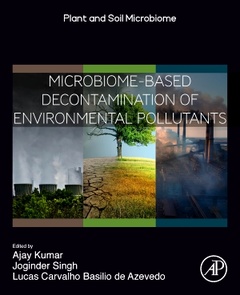Microbiome-Based Decontamination of Environmental Pollutants PASM Plant and Soil Microbiome Series
Coordonnateurs : Kumar Ajay, Panwar Joginder Singh, Azevedo Lucas Carvalho Basilio de

Microbiome-Based Decontamination of Environmental Pollutants explores the complex interactions of plant-associated microbiomes, providing insights into the pressing challenges of managing environmental resources such as soil, water, and waste. Analysis has shown a formidable potential based in the network interactions between plant microbiota and environmental contaminants. This book presents insights into the potential exploitation of these plant-associated microbial functions. This volume in the Plant and Soil Microbiome series summarizes microbiological aspects of environmental management from the basics to advanced theoretical as well as practical aspects of microbial-based approaches. The physical and chemical changes caused by pollution of an ecosystem can occur rapidly, significantly impacting the functionality of ecosystem services in that environment. Environmental contamination poses and increasingly global challenge through direct and indirect adverse impacts on the climate, soil productivity and the health concerns of human beings. Traditional remediation techniques are not consistently feasible in mitigating environmental contaminants challenges in terms of cost-effectiveness, limited land resources and toxic residual products. The use of plant-associated microbes as part of a network of tools opens a new door to explore an alternative, eco-friendly and economical technology to mitigate the challenges of environmental contamination.
2. Significance, mechanisms and environmental implications of microbe mediated remediation
3. Microbiome immobilized sorbents: status and future aspects
4. Understanding and Designing the Strategies for the Microbe-Mediated Remediation of Environmental Contaminants Using Omics Approaches
5. Microbial Indicators for Monitoring Pollution and Bioremediation
6. Bioremediation of high molecular weight polycyclic aromatic hydrocarbons
7. Biochemical approach in microbial degradation organic contaminants
8. Microbial Bioremediation of Metal and radionuclides: Approaches and Advancement
9. Microbe assisted remediation of xenobiotics: A sustainable solution
10. Importance of microbial surfactants in heavy metal remediation
11. Role of Microbial biofilms in bioremediation: Current Perspectives
12. Applications of Microbial extracellular polysaccharides in Bioremediation
13. Exploring the potential of cyanobacteria in contamination management
14. Potential use of Endophytic microbe in environment contamination management
15. Environmental antibiotics and resistance genes as emerging contaminants: and their bioremediation
16. Synthetic Microbial Consortia: utilization in environment sustainability
17. Microbiological risk assessment of food OR genetically modified organisms
Dr. Ajay Kumar is currently working as an assistant professor at Amity Institute of Biotechnology, Amity University, Noida, India. Dr. Kumar recently completed his tenure as a visiting scientist from Agriculture Research Organization, Volcani Center, Israel. He has published more than 200 research, review articles, and book chapters in international and national journals. He serves as an associate editor for Frontiers in Microbiology, BMC Microbiology and as guest editor for various journals such as Plants, Microorganisms, and Sustainability. Dr. Kumar has also edited more than 40 books with the leading publishers such as Elsevier, Springer, and Wiley. Dr. Kumar’s research experience is in the field of plant–microbe interactions, postharvest management, cyanobacterial biology, and so on
Prof. Joginder Singh is a Professor in the Department of Botany at Nagaland University in India. Previously, he has worked as Young Scientist at Microbial Biotechnology and Biofertilizer Laboratory, Department of Botany, Jai Narain Vyas University in Department of Science and Technology, Govt. of India. He is an active member of various scientific societies and organizations including, Association of Microbiologists of India, Indian Society of Salinity Research Scientists, Indian Society for Radiation Biology, and European Federation of Biotechnology. He has published extensively, including both journal papers and book chapters. He serves as a reviewer for many prestigious journals, including Current Research in Engineering, Science and Technology, Journal of Cleaner Production, Science of the Total Environment, Environmental Monitoring and Assessment, Pedosphere, Soil and Sediment Contamination, Symbiosis, International Journal of Phytoremediation, Ecotoxicology and Environmental Safety, Annals of Agricultural Sciences, Annals of the Brazilian Academy of Sciences and many more.
Dr. Lucas C. B. Azevedo holds a degree in Agronomy (State University of Londrina, Brazil), M
- Explores the emerging plant microbe interactive nexus for contaminants degradation
- Presents insights into the production and commercialization of plant-microbiome based enzymes
- Includes engineered microbes and microbial products application in contaminant management
- Highlights the latest omics and technologies used in plant–soil microbiome in contaminant management
Date de parution : 04-2024
Ouvrage de 494 p.



